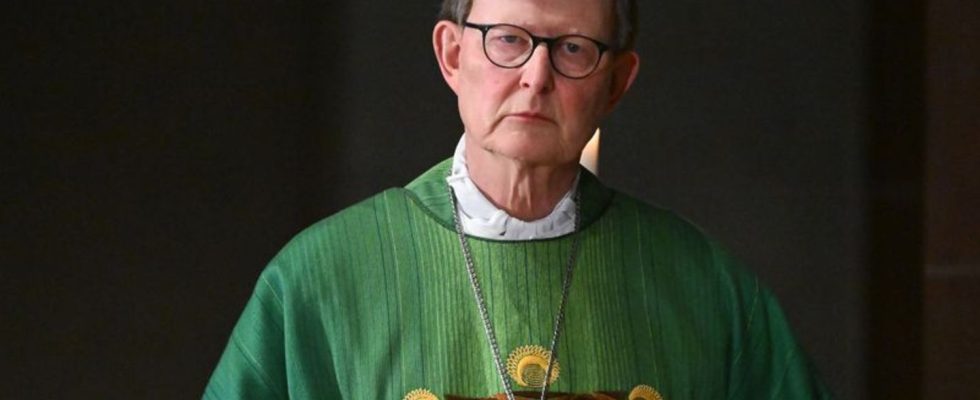Archbishop of Cologne
2024 – the year of truth for Cardinal Woelki
“I definitely won’t go and perjure myself as a bishop,” the archbishop assured in an interview with the German Press Agency in 2022. photo
© Arne Dedert/dpa
2024 marks the tenth anniversary of the appointment of Rainer Maria Woelki as Archbishop of Cologne. But there is little to celebrate.
This confirmed everything he had said before. And this despite the fact that as a process observer you could definitely get the impression at one point or another that the churchman was giving answers with a certain nonchalance and based on general memory. What many had suspected promptly happened: Woelki was reported for having made false statements.
The public prosecutor’s office then expanded its investigations against the head of Germany’s largest diocese, which have been ongoing since November 2022. Now not only the accusation of false assurance under oath was examined, but also that of perjury. Woelki himself sees himself as being wrongly accused: “I definitely won’t go and perjure myself as a bishop,” he asserted in an interview with the German Press Agency in 2022.
Lots of data confiscated
In June 2023, as part of the investigation, the public prosecutor’s office even searched Woelki’s residence, the Archbishop’s House in downtown Cologne, and confiscated a lot of data. Their evaluation is currently still ongoing. As the public prosecutor’s office told dpa, the investigation is expected to drag on for several more months.
Essentially, the question is at what point in time Woelki was informed about allegations of abuse against priests. The cardinal had originally taken legal action himself to defend himself against reports in the “Bild” newspaper. He was able to win his lawsuits several times, but the civil proceedings resulted in criminal investigations by the public prosecutor’s office. Because Woelki’s affidavits did not go unchallenged in every respect. A former employee of the archdiocese explained in an interview with the “Kölner Stadt-Anzeiger” that she “couldn’t stand it anymore (…) knowing first-hand things that contradict Cardinal Woelki’s public statements.”
Lawsuits against “Bild”
One would like to know whether Woelki is still convinced deep down that the lawsuits against “Bild” were worth all the trouble – or whether he now wishes he had swallowed his frustration back then and let the matter rest . The year 2024, which has just begun, offers many additional opportunities to look back, because in September it will be ten years since Woelki was ceremoniously inaugurated into office in Cologne Cathedral. After 25 leaden years under the ultra-conservative Cardinal Joachim Meisner, great expectations were associated with the new archbishop. The green Catholic Sylvia Löhrmann – at the time deputy prime minister of North Rhine-Westphalia – explained in the celebratory service that Woelki “fits in with a new, modern Catholic church.” Among other things, she is thinking about the role of women in the church and alternative forms of partnership.
His critics are more likely to be publicly visible
However, that turned out to be just wishful thinking. Woelki opposed any liberal reform, from communion for remarried divorcees to blessings for homosexual couples to the Synodal Way renewal process. Criticism rolled off him. “There are people who can be talked to like a dead horse,” sighed the chairman of the German Bishops’ Conference, Georg Bätzing, some time ago. The Limburg bishop – a determined reformer – accuses Woelki of having “lost people’s acceptance.”
Woelki himself sees it differently and points out that he also receives a lot of encouragement and support. However, his critics are more publicly visible: parishioners who show Woelki the red card, altar boys who demonstratively turn their backs on him, or even Pope Francis, who certified that he made “big mistakes” in 2021 and ordered him to take a break of several months. Woelki also had to tender his resignation from office. However, nothing has been heard of this since then, so it can be assumed that the Pope wants to keep him in office for the time being.
In 2024, it will likely be decided in a different way what happens next with Woelki: If the investigation results in an indictment, he would have to answer in court and even fear imprisonment. If the investigation is stopped, the now 67-year-old archbishop can hope to continue for another eight years. It is not until the age of 75 that a Catholic bishop usually asks the Pope to allow him to retire. Until that happens, many reform-oriented Catholics in the Archdiocese of Cologne could leave the church in frustration.

